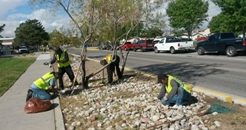 A sign that read: “Want a Job. Anything Helps.”
A sign that read: “Want a Job. Anything Helps.”
The city adminstration of Albuquerque, USA, led by Mayor Richard Berry started in May 2015 to try new ways to connect homeless people on the streets to local services. The Mayor had been regularly talking to street people who told him they didn’t want to be on the streets begging for money, but they didn’t know where else to go.
As he says, "We started with fifteen dial 311 signs. We did that for a reason. We wanted to connect people with services. If somebody's standing on a corner asking for money, they're doing that for a reason. They either need to get connected with services, food, shelter, something is going on. Their life is not going well so we put the signs up for a primary purpose of saying, 'Listen, if you're standing here, call 311.' Since we put those signs up, we've had over 7,200 people call that 311 number. Some want to donate to the program and that's great, but the majority of them need help. We have neighbourhoods now asking for more signs. It's been very popular from that standpoint."
Later as the Mayor was driving around, he saw a man on a street corner holding a sign that read: “Want a Job. Anything Helps.” Seeing that sign gave the mayor an idea. Instead of asking them to go out looking for work, the city could bring the work to them.
This month (September 2016) will be the first anniversary of Albuquerque’s There’s a Better Way program, which hires street people for day jobs tidying up the city in partnership with a local charity, St Martin's, that serves the homeless population. Two days a week, a van is dispatched around the city to pick up street people who are interested in working. The job pays $9 (£7) an hour, which is above minimum wage, and provides a lunch. At the end of the 5.5 hour shift, the participants are offered overnight shelter as needed.
The Mayor continues, "We'll ask them if they want a job for the day. If they want the dignity of work, if they would like to help keep their community clean just like it's your community and my community and almost all the time they say, 'Yes.' And so far, we have paid people to clean up 120 city blocks. We've picked up almost 50,000 pounds of trash and weeds. 527 day jobs have been created through this program. 25% of the folks that are working with us have opted to invest in themselves by taking services that St Martin's connect them with, whether that's mental health services, whether that's substance abuse services, whatever it happens to be. 34 of these folks have obtained permanent employment. That means there's 34 people that were on the street that now have a job because they got a chance on one day or two days to prove themselves."
Over 70 cities in the USA have called the adminstration and they have been covered by TV and other media. They've had personal conversations with other mayors and people that want to do this in their cities and some have started. In Seattle they're cleaning up after some of the football games and events in other stadiums.
The program is changing lives as well as making the city more beautiful. Due to the impact, the program has been recently doubled from two days a week to four days a week.
The Mayor concludes, "People ask me all the time, 'Who are folks that are on the streets?'. The short answer is there's a lot of different people. There's a lot of different circumstances. Some of the folks are born and raised in Albuquerque. Some are simply passing through such as a young man named Andrew and a young woman named Krista. They just didn't have the resources to get back to Texas to get home. They gladly accepted a job for the day. They went out and made a few extra dollars and bought bus tickets back to Texas. Andrew now has a full-time job in his town and Krista's now working towards her high school exam. So this program doesn't just help our brothers and sisters who live here but it helps people that are passing through get on and get back and get their lives on track."
Here's a video that gives more detail:
Could church-linked homeless initiatives take a lead on this in our cities, working with authorities? I can hear lots of reasons, why not e.g. permission to work, health and safety, earnings reporting. Perhaps we should focus on a different question, 'how can we?'.
Contact me if you pursue this - it would be good to hear of your experiences.
Retweet about this article:
Geoff Knott, 14/09/2016